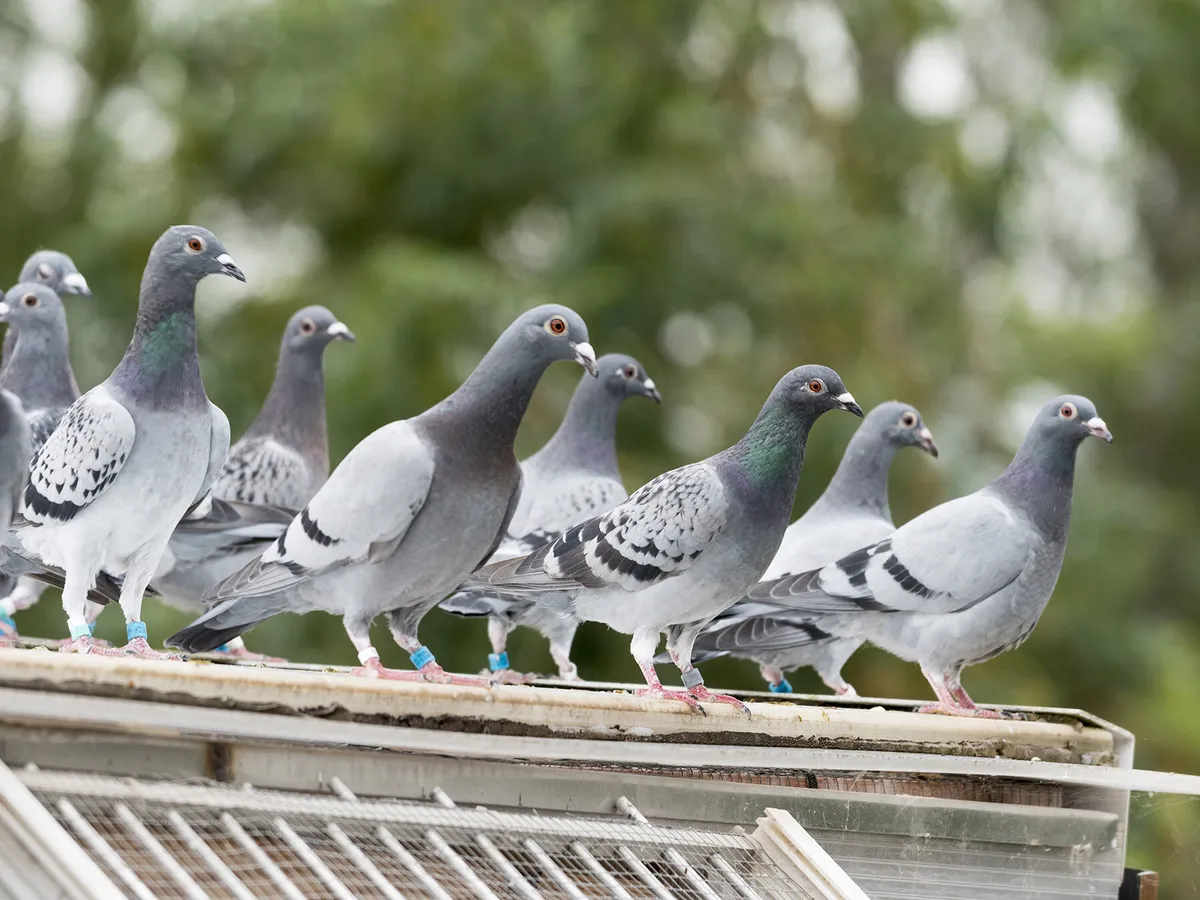
Fatty Liver Disease in Racing Pigeons
Fatty Liver Disease in Racing Pigeons: Causes, Prevention, and Management
Fatty liver disease, also known as hepatic lipidosis, is a silent but serious condition that can affect racing pigeons, especially during breeding, winter rest, or periods of overfeeding. If left unchecked, it can reduce a bird’s lifespan, weaken performance, and even cause sudden death. For fanciers who want to keep their pigeons in peak health, understanding fatty liver disease is crucial.
In this post, we’ll explore what fatty liver disease is, the causes and signs to look out for, and most importantly—how to prevent and manage it effectively using practical, loft-friendly strategies.
What Is Fatty Liver Disease?
Fatty liver disease in pigeons occurs when excess fat accumulates in the liver. The liver, being a vital organ for detoxification and metabolism, becomes enlarged, pale, and fragile. This condition hinders its ability to function, which in turn affects digestion, immunity, and overall health.
While it might sound like a condition only seen in overweight birds, even pigeons with normal body weight can develop fatty liver if they’re fed a high-energy diet without enough exercise or if they’re exposed to certain environmental stressors.
What Causes Fatty Liver Disease in Pigeons?
Several factors contribute to fatty liver disease, but the most common causes in racing and breeding lofts include:
1. High-Energy, High-Fat Diets
Feeding pigeons diets that are rich in corn, sunflower seeds, and other fatty grains without balancing with fiber and lean proteins can lead to fat buildup in the liver over time.
2. Lack of Exercise
Birds that are confined for long periods, such as during winter rest or breeding, are at greater risk of developing hepatic lipidosis.
3. Vitamin Deficiencies
A deficiency in vitamins—especially vitamin B12, biotin, and choline—can impair fat metabolism in the liver, leading to accumulation.
4. Overbreeding or Overfeeding During the Off-Season
Breeding birds that receive more energy than they need for egg production or squab feeding may develop liver issues quickly if diet isn’t adjusted.
5. Toxins or Infections
Certain bacterial toxins and long-term medications can compromise liver health, especially when liver function is already weakened by poor nutrition.
Common Symptoms of Fatty Liver in Racing Pigeons
Fatty liver often goes unnoticed until it’s in an advanced stage, but there are subtle signs to look out for:
-
Lethargy and poor motivation to fly
-
Sudden drops in performance or inability to finish races
-
Excessive weight gain or abnormal fat deposits around the abdomen
-
Yellow or greenish droppings
-
Rough or dull feathering
-
Poor appetite or sudden loss of interest in feed
-
Increased susceptibility to infections
In severe cases, birds may die suddenly without any noticeable symptoms—making prevention even more critical.
Diagnosing Fatty Liver Disease
Veterinarians can diagnose fatty liver through:
-
Palpation: Feeling for an enlarged liver
-
Blood tests: Assessing liver enzyme levels
-
Necropsy: In the case of sudden death, a post-mortem examination can reveal a swollen, pale-yellow liver—classic signs of hepatic lipidosis.
Prevention: How to Protect Your Flock
Preventing fatty liver disease is far easier and more cost-effective than treating it. Here’s what you can do to keep your birds’ livers healthy:
1. Offer a Balanced Diet
Feed grains in proper ratios. A high-fat diet must be balanced with easily digestible grains like barley, wheat, and rice.
-
Include barley in winter and breeding mixes for its slow energy release and digestive benefits.
-
Avoid overfeeding corn and sunflower seeds, especially in confined birds.
2. Add Liver-Support Supplements
Supplements that contain choline, methionine, biotin, vitamin E, and B-complex are ideal for liver support. These ingredients help metabolize fats and prevent their accumulation in liver tissues.
Products like PHP Liver Tonic or Vet Schroeder Tollisan Fungi Powder (for gut-liver axis health) are helpful during the offseason or when symptoms arise.
3. Keep Birds Active
Even during rest periods, encourage short flights or controlled exercise when possible. Movement helps burn off excess fat and supports normal liver function.
4. Avoid Over medication
Long-term use of antibiotics or unnecessary treatments can place extra stress on the liver. Always consult a vet and use medications only when necessary.
5. Maintain Loft Hygiene and Air Quality
A clean loft with proper ventilation prevents exposure to airborne toxins that can stress the liver. Keep ammonia and dust levels low.
Managing Fatty Liver Disease in Pigeons
If you suspect or confirm fatty liver in your birds, here’s how to manage the condition:
1. Adjust the Diet Immediately
-
Cut back on fatty grains.
-
Introduce more barley, oats, and safflower, which offer moderate energy.
-
Add greens like spinach, dandelion, or kale for fiber and micronutrients.
2. Use Targeted Supplements
-
Administer liver-supporting vitamins like B-complex and E.
-
Products that include choline and silymarin (milk thistle extract) can rejuvenate liver tissue.
3. Probiotics and Gut Health
The gut and liver are closely connected. Use probiotics to promote healthy digestion and reduce toxin production that burdens the liver.
4. Hydration
Ensure your pigeons have access to clean, fresh water at all times. Adding electrolytes and mild detoxifiers once a week can assist in flushing the system.
Fatty Liver and Breeding Performance
Breeders should be particularly vigilant. A hen with fatty liver may:
-
Lay fewer eggs
-
Have weak or infertile eggs
-
Fail to feed squabs properly
-
Be prone to sudden death during stress
By ensuring hens and cocks are on a well-managed diet pre-breeding, you protect not only the individual birds but the success of the entire breeding season.
Here’s a Diet Chart and Supplement Schedule designed specifically to support liver health in racing pigeons during winter and breeding seasons. It balances moderate energy, essential vitamins, and liver detox support while promoting digestion and immunity.
🕊️ Winter & Breeding Season Diet Chart (Weekly Rotation)
| Day | Feed Mix (Percentages) | Supplements (Add to Grain or Water) | Purpose |
|---|---|---|---|
| Monday | 50% Barley, 25% Wheat, 15% Safflower, 10% Mung Beans | PHP Liver Tonic + Multivitamins (in water) | Liver support + general immunity |
| Tuesday | 40% Barley, 30% Corn, 15% Green Peas, 15% Safflower | Probiotic + Electrolytes (water) | Gut health + hydration |
| Wednesday | 60% Barley, 20% Lentils, 10% Wheat, 10% Rice | B-complex + Vitamin E (in drinking water or over feed with oil binder) | Liver regeneration + energy metabolism |
| Thursday | 40% Barley, 30% Corn, 20% Peas, 10% Sunflower Seeds | Garlic + Apple Cider Vinegar (ACV) in water | Detoxification + digestion |
| Friday | 50% Barley, 25% Wheat, 15% Green Peas, 10% Safflower | Silymarin (milk thistle) or herbal liver detox (per product instructions) | Liver cell repair |
| Saturday | 60% Barley, 30% Rice, 10% Hemp Seed | Light vitamin mix or immune booster (e.g., oregano oil-based) | Recovery + feather/immune support |
| Sunday | 100% Barley (light day / fasting day) | Clean fresh water only | Digestive rest + liver recovery |
Recommended Supplements for Liver Health
| Supplement | Frequency | Function |
|---|---|---|
| PHP Liver Tonic | 2x/week | Detoxifies and supports liver metabolism |
| B-Complex + Vitamin E | 2x/week | Supports energy conversion and tissue repair |
| Milk Thistle (Silymarin) | 1–2x/week | Rebuilds damaged liver cells, protects against toxins |
| Oregano-Based Immune Booster | 1x/week | Prevents bacterial overload in stressed birds |
| Apple Cider Vinegar (ACV) | 2x/week (5 ml/L water) | Helps pH balance, digestion, and gentle detoxification |
| Probiotics + Electrolytes | 1x/week or as needed | Enhances gut flora and supports recovery post-exertion |
Additional Tips for Success
-
Avoid overfeeding corn or sunflower seeds, especially in non-racing months.
-
Always provide grit and fresh minerals, as liver metabolism requires micronutrients like calcium and magnesium.
-
Use hemp or linseed oil 1–2x/week to coat grain if needed for supplement binding—avoid animal fats in winter.
-
Weigh birds weekly to ensure they are not gaining excess fat.
-
Keep loft warm and dry, but avoid overheating—moderate cold encourages natural metabolic activity.
Conclusion: A Healthier Liver, a Stronger Loft
Fatty liver disease is more common than most pigeon fanciers realize—but it’s also one of the most preventable conditions. Through balanced nutrition, smart supplementation, and thoughtful management, you can ensure your racing pigeons maintain excellent health, strong immunity, and consistent performance.
Remember: Prevention is always better than cure. Stay proactive with feeding, offer liver support during stressful times, and your pigeons will reward you with longevity, vitality, and top results.

